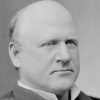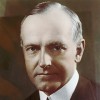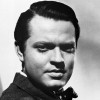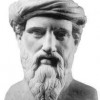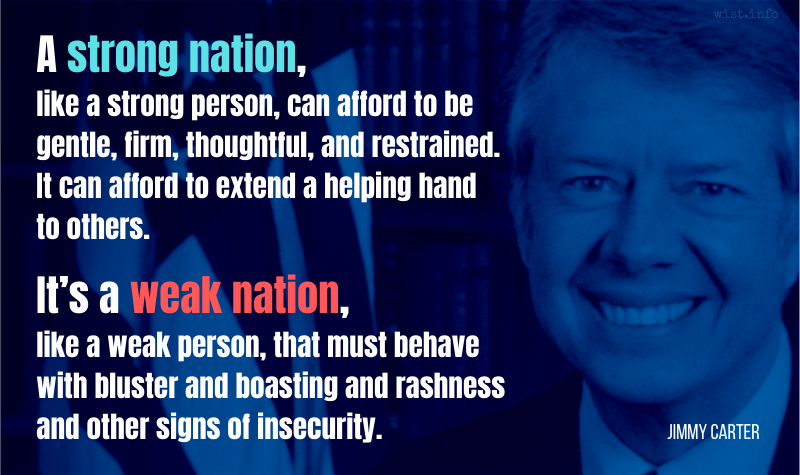As far as your self-control goes, as far goes your freedom.
[So weit Deine Selbstbeherrschung geht, so weit geht Deine Freiheit.]
Marie von Ebner-Eschenbach (1830-1916) Austrian writer
Aphorisms [Aphorismen], No. 534 (1880)
(Source)
(Source (German)). Alternate translation:
Freedom stretches as far as your self-control.
[tr. Scrase/Mieder (1994)]
Quotations about:
restraint
Note not all quotations have been tagged, so Search may find additional quotes on this topic.
The charge is often made against etiquette that it is artificial. Yes, indeed, it is. Civilization is artificial. When people extoll the virtues of naturalness, honesty, informality, intimacy, and creativity — watch out. Honesty has come to mean the privilege of insulting you to your face without expecting redress, and creativity that it is wrong to interfere with a child who is destroying your possessions. It is apparently natural behavior to treat the sick, the disabled, and the bereaved with curiosity and distaste, but it is also highly uncivilized.
Judith Martin (b. 1938) American author, journalist, etiquette expert [a.k.a. Miss Manners]
Common Courtesy, “In the Quest for Equality, Civilization Itself Is Maligned” (1985)
(Source)
Originally published in The New Republic in 1984.
A little embarrassment prevents a lot of goodness.
Mignon McLaughlin (1913-1983) American journalist and author
The Neurotic’s Notebook, ch. 8 (1963)
(Source)
‘Tis the Glory and Merit of some men to write well, and of others not to write at all.
[La gloire ou le mérite de certains hommes est de bien écrire; et de quelques autres, c’est de n’écrire point.]Jean de La Bruyère (1645-1696) French essayist, moralist
The Characters [Les Caractères], ch. 1 “Of Works of the Mind [Des Ouvrages de l’Esprit],” § 59 (1.59) (1688) [Bullord ed. (1696)]
(Source)
(Source (French)). Alternate translations:
'Tis the Glory or the Merit of some Men to write well; and of others not to write at all.
[Curll ed. (1713)]
It is the Glory and Merit of some Men to write well, and of others not to write at all.
[Browne ed. (1752)]
It is the glory and the merit of some men to write well, and of others not to write at all.
[tr. Van Laun (1885)]
The glory or merit of certain men lies in writing well: that of certain others, in not writing at all.
[tr. Stewart (1970)]
It is easier not to speak a word at all, than not to speak more words than we should.
[Facilius est enim tacere quam in verbo non excedere.]
Thomas à Kempis (c. 1380-1471) German-Dutch priest, author
The Imitation of Christ [De Imitatione Christi], Book 1, ch. 20, v. 2 (1.20.2) (c. 1418-27) [ed. Parker (1841)]
(Source)
(Source (Latin)). Alternate translations:
For it is not so hard to keep always silence, as it is not to exceed in words when we speak much.
[tr. Whitford/Raynal (1530/1871)]
For it is not so hard always to keep silence as it is not to exceed in words when we speak much.
[tr. Whitford/Gardiner (1530/1955)]
It is easier not to speak a word at all, then not to speake more words then we should.
[tr. Page (1639), 1.20.6]
'Tis certainly much easier for a Man to restrain himself from Talking at all, than to enter into Discourse, and not say more than becomes him.
[tr. Stanhope (1696; 1706 ed.)]
For it is much easier to be wholly silent, than not to exceed in word.
[tr. Payne (1803), 1.20.3]
It is much easier to be wholly silent, than not to exceed in talk.
[tr. Dibdin (1851)]
It is easier to be altogether silent, than not to go to excess in speaking.
[ed. Bagster (1860)]
For it is easier to be altogether silent than it is not to exceed in word.
[tr. Benham (1874)]
It is easier not to speak at all, than not to exceed in speech.
[tr. Anon. (1901)]
It is easier to be silent altogether than not to speak too much.
[tr. Croft/Bolton (1940)]
It is easier to be quite silent than not to say a word too much.
[tr. Daplyn (1952)]
It is easier to keep silence altogether than not to talk more than we should.
[tr. Sherley-Price (1952)]
Easier to keep your mouth shut than to talk without saying too much.
[tr. Knox-Oakley (1959)]
It is easier to keep quiet altogether than not to say a word too much.
[tr. Knott (1962)]
To remain entirely silent is easier than not to talk too much.
[tr. Rooney (1979)]
It is easier to be completely silent than not to be long-winded.
[tr. Creasy (1989)]
Temperance.
Temperance and honoring the gods. It’s the best we can do.
The smartest thing mortals can choose to do.[τὸ σωφρονεῖν δὲ καὶ σέβειν τὰ τῶν θεῶν
κάλλιστον: οἶμαι δ᾽ αὐτὸ καὶ σοφώτατον
θνητοῖσιν εἶναι κτῆμα τοῖσι χρωμένοις.]Euripides (485?-406? BC) Greek tragic dramatist
Bacchæ [Βάκχαι], l. 1150ff [Messenger/Ἄγγελος] (405 BC) [tr. Pauly (2019)]
(Source)
After recounting the brutal murder and dismemberment of Pentheus by the Bacchantes in punishment of his disrespect to Dionysus.
(Source (Greek)). Alternate translations:
For modest worth, and reverence for the Gods,
Are, in my judgement, the most certain marks
Of glory and of wisdom in mankind.
[tr. Wodhull (1809)]
Soundness of mind and reverence for the affairs of the gods is best; and this, I think, is the wisest possession for those mortals who adopt it.
[tr. Buckley (1850)]
Oh! to be reverent, to adore the gods,
This is the noblest, wisest course of man,
Taking dread warning from this dire event.
[tr. Milman (1865)]
For soberness and reverence for the gods
I deem the wisest and the best of things
To all such men as learn this lesson well.
[tr. Rogers (1872)]
To my mind self-restraint and reverence for the things of God point alike the best and wisest course for all mortals who pursue them.
[tr. Coleridge (1891)]
Ay, self-restraint, and reverence for the Gods
Are best, I ween; 'tis wisest far for men
To get these in possession, and cleave thereto.
[tr. Way (1898)]
Oh, to fulfil
God's laws, and have no thought beyond His will,
Is man's best treasure. Aye, and wisdom true,
Methinks, for things of dust to cleave unto!
[tr. Murray (1902)]
Humility,
a sense of reverence before the sons of heaven --
of all the prizes that a mortal man might win,
these, I say, are wisest; these are best.
[tr. Arrowsmith (1960)]
To be of sound mind and reverence the things divine
is finest -- and I think it is also the wisest
practice for mortal men to follow.
[tr. Kirk (1970)]
The noblest thing a man can have is a humble and quiet heart that reveres the gods. I think that is also the wisest thing for a man to possess, if he will be use it.
[tr. Vellacott (1973)]
Pure thought, and reverence for what is god’s --
this is the fairest and, I think, the wisest
possession mortals can employ.
[tr. Neuburg (1988)]
I am but a simple man, yet to me
reverence and humility before the Gods
is best for all men. It is also the only wisdom.
If only men would use it. So I think.
[tr. Cacoyannis (1982)]
To be moderate and honor godly things
Is best. I think it the wisest possession
For mortal men, if they use it well.
[tr. Blessington (1993)]
Moderation and reverence for things divine,
this is the best course. And it is also, I think,
the wisest possession for those mortals who use it.
[tr. Esposito (1998)]
But this is the highest glory: have a sound mind and reverence for
whatever belongs to the gods. This too is the most wise
of all pursuits a human being can follow.
[tr. Woodruff (1999)]
Wise moderation and a reverence
For what is of the gods -- this is what’s best.
And this, I think, of all possessions owned
By mortals, is the wisest one to use.
[tr. Gibbons/Segal (2000)]
The best thing of all is to practice moderation and worship the gods. That is also, I think, the wisest possession a mortal can make use of.
[tr. Kovacs (2002)]
The greatest wisdom is humility,
It is the greatest gift the gods give us;
Most wise the man who uses it.
[tr. Teevan (2002)]
Wisdom and respect for the gods is a great virtue and a possession most worthy for the mortals to have.
[tr. Theodoridis (2005)]
For having a mind that respects the affairs of divine ones
is the most beautiful thing on earth, and I think
it is the wisest thing someone could do.
[tr. Valerie (2005)]
The best thing is to keep one's mind controlled,
and worship all that comes down from the gods.
That, in my view, is the wisest custom,
for those who can conduct their lives that way.
[tr. Johnston (2008), l. 1428ff]
This is another lesson:
that moderation and reverence for the gods
are a mortal's best possession.
[tr. Robertson (2014), l. 1149ff]
For I believe
that our most beautiful possessions are sanity and a love of the gods.
The wise are those who use wisdom.
[tr. Behr/Foster (2019)]
Balance [sōphroneîn] and reverence for the affairs of the gods is best. I think this is the most sophon possession for mortals’ use.
[tr. Buckley/Sens/Nagy (2020)]
Humility, a sense of reverence before the sons of heaven --
of all the prizes that a mortal man might win
these, I say, are wisest; these are best.
[Bartlett's]
We want perfection in other people, and yet we do not put right our own failings. We want to see others firmly corrected, but we refuse correction ourselves. We take offence when permission is given to others, but we do not want our own requests refused. We want rules to check the activities of others, but we are indignant at restrictions on ourselves.
[Libenter videmus alios perfectos, sed tamen proprios non emendamus defectus. Volumus quod alii districte corrigantur, et nos ipsi corrigi nolumus, aut negari quod petimus. Alios restringi per statuta volumus, et ipsi nullatenus patimur amplius cohiberi.]
Thomas à Kempis (c. 1380-1471) German-Dutch priest, author
The Imitation of Christ [De Imitatione Christi], Book 1, ch. 16, v. 2ff (1.16.2-3) (c. 1418-27) [tr. Knott (1962)]
(Source)
(Source (Latin)). Alternate translations:
We would gladly have others perfect, but will not amend our own defaults. We would that others should be straitly corrected for their offences, but we will not be corrected. It misliketh us that others have liberty, but we will not be denied of that we ask. We would also that others should be restrained according to the statutes, but we in nowise will be restrained.
[tr. Whitford/Raynal (1530/1871)]
We would gladly have others perfect, yet we will not amend our own faults. We desire others to be strictly corrected for their offenses, yet we will not be corrected. We dislike it that others have liberty, yet we will not be denied what we ask. We desire that others should be restrained according to the laws, yet we will in no way be restrained.
[tr. Whitford/Gardiner (1530/1955)]
It is injustice to expect that in another which thou hast not in thy self, to looke for perfection in others, and yet not to amend imperfections in our selves. We will have others severely punisht, and will not amend our selves; the large liberty of others disliketh us, and yet we will not have our desires deni'd us, we will have rigorous Lawes imposed upon others, but in no sort will we our selves be restrained.
[tr. Page (1639), 1.16.8-9]
And, indeed, nothing is more common, than to express exceeding Zeal in amending our Neighbours, and mighty Indignation against Their Vices or Imperfections, while at the same time we neglect the beginning at Home, and either quite overlook, or seem highly contented with our own. We set up for Reformers, declaim at the Wickendess of the Age, and are all for suppressing and punishing it by vigorous Laws; and yet are unwilling that any Check or Restraint should be put upon our own Freedoms.
[tr. Stanhope (1696; 1706 ed.)]
But we require perfection in the rest of mankind, and take no care to rectify the disorders of our own heart; we desire that the faults of others should be severely punished, and refuse the gentlest correction ourselves; we are offended at their licentiousness, and yet cannot bear the least opposition to our own immoderate desires. We would subject all to the control of rigorous statute and penal laws, but will not suffer any restraint upon our own actions.
[tr. Payne (1803), 1.16.3]
We would willingly have others perfect, and yet we amend not our own faults. We will have others severely corrected, and will not be corrected ourselves. The large liberty of others displeaseth us; and yet we will not have our own desires denied us. We will have others kept under by strict laws; but in no sort will ourselves be restrained.
[ed. Parker (1841)]
We willingly require perfection in the rest of mankind, and yet do not rectify the disorders of our own hearts. We desire that the faults of others should be severely punished, and refuse the gentlest correction ourselves. We are offended at their licentiousness, and yet cannot bear the least denial of our own immoderate desires. We would subject all to the control of rigorous statutes, but suffer no restraint upon our own action.
[tr. Dibdin (1851)]
We would fain have others perfect, and yet we amend not our own defects. We would have others strictly corrected, but will not be corrected ourselves. The large liberty of others displeases us, and yet we would not be denied anything we ask for. We wish others to be bound down by laws, and we suffer ourselves to be in no sort restrained.
[ed. Bagster (1860)]
We are ready to see others made perfect, and yet we do not amend our own shortcomings. We will that others be straitly corrected, but we will not be corrected ourselves. The freedom of others displeaseth us, but we are dissatisfied that our own wishes shall be denied us. We desire rules to be made restraining others, but by no means will we suffer ourselves to be restrained.
[tr. Benham (1874)]
We are desirous to have others perfect, and yet we amend not our own faults. We will have others severely corrected, and will not be corrected ourselves. The large liberty of others displeaseth us; and yet we will not have our own desires denied us. We will have others kept under by strict laws; but in no sort will we ourselves be restrained.
[tr. Anon. (1901)]
We want them to be perfect, yet we do not correct our own faults. We wish them to be severely corrected, yet we will not correct ourselves. Their great liberty displeases us, yet we would not be denied what we ask. We would have them bound by laws, yet we will allow ourselves to be restrained in nothing.
[tr. Croft/Bolton (1940)]
We would readily have others perfect and yet not amend our own defects. We want others rigidly corrected and are unwilling to be corrected ourselves. The wide freedom of others displeases us, and yet we would not be denied whatever we ask. We wish others to be bound by rules, and will ourselves in no way be held in.
[tr. Daplyn (1952)]
For we require other people to be perfect, but do not correct our own faults. We wish to see others severely reprimanded; yet we are unwilling to be corrected ourselves. We wish to restrict the liberty of others, but are not willing to be denied anything ourselves. We wish others to be bound by rules, yet we will not let ourselves be bound.
[tr. Sherley-Price (1952)]
We like to have everybody around us quite perfect, but our own faults -- we never seem to correct them. Tom, Dick and Harry must be strictly called to order, but we aren't fond of being called to order ourselves. It is always the other man that has too much rope given him -- our wishes must not be thwarted; rules for everybody else, but our own liberties must not be abridged for a moment.
[tr. Knox-Oakley (1959), 1.16.3]
Though quick to expect perfection in others, we take little care to correct our own shortcomings. We wouidl have others strictly corrected, but not ourselves. The wide freedom of others displeases us, yet we wish to be denied nothing that we ourselves desire. We would have others under the restraint of the rule while unwilling ourselves to be under any sort of restraint.
[tr. Rooney (1979)]
We would willingly have others be perfect, and yet we fail to correct our own faults. We want others to be strictly corrected, and yet we are unwilling to be corrected ourselves. Other peoples' far-ranging freedom annoys us, and yet we insist on having our own way. We wish others to be tied down by rules, and yet we will not allow ourselves to be held in check in any way at all.
[tr. Creasy (1989)]
If men knew how to blush at their own actions, how many crimes, and not only those that are hidden, but those that are public and well known, would never be committed!
[Si l’homme savait rougir de soi, quels crimes, non seulement cachés, mais publics et connus, ne s’épargnerait-il pas!]
Jean de La Bruyère (1645-1696) French essayist, moralist
The Characters [Les Caractères], ch. 11 “Of Mankind [De l’Homme],” § 151 (11.151) (1688) [tr. Van Laun (1885)]
(Source)
(Source (French)). Alternate translations:
If men could blush at their own actions, how many sins, publick and private, would they save by it?
[Bullord ed. (1696)]
If Men knew how to blush at their own Actions, how many Crimes, publick and private, would they save by it!
[Curll ed. (1713)]
If Men could blush for themselves, how many Sins, public and private, would they save by it!
[Browne ed. (1752)]
If a man knew how to blush at his own actions, what crimes, not only secret but public and overt, would he not spare himself!
[tr. Stewart (1970)]
If you want to go off by yourself and be a hermit, you can do whatever you want. But if you want interaction with other people, then by definition you have to buy into the social contract and restrain some of your behavior some of the time.
Judith Martin (b. 1938) American author, journalist, etiquette expert [a.k.a. Miss Manners]
“Polite Company,” interview by Hara Estroff Marano, Psychology Today (1998-03)
(Source)
War is an act of violence, which in its application knows no bounds
[Der Krieg ist ein Akt der Gewalt, und es gibt in der Anwendung derselben keine Grenzen.]
Karl von Clausewitz (1780-1831) Prussian soldier, historian, military theorist
On War [Vom Kriege], Book 1, ch. 1 “What Is War? [Was ist der Krieg?],” § 3 (1.1.3) (1832) [tr. Graham (1873)]
(Source)
(Source (German)). Alternate translations:
War is an act of violence pushed to its utmost bounds.
[tr. Graham/Maude (1908)]
War is an act of force, and to the application of that force there is no limit.
[tr. Jolles (1943)]
War is an act of force, and there is no logical limit to the application of that force.
[tr. Howard & Paret (1976)]
It is therefore not true that against nature there is neither rein nor master. On the contrary, there are two of them: one is good manners, the other reason.
[Non è adunque vero che incontro alla natura non abbia freno né maestro: anzi ve ne ha due, ché l’uno è il costume e l’altro è la ragione.]
Giovanni della Casa (1503-1556) Florentine poet, author, diplomat, bishop
Galateo: Or, A Treatise on Politeness and Delicacy of Manners [Il Galateo overo de’ costumi], ch. 25 (1558) [tr. Eisnbichler/Bartlett (1986)]
(Source)
(Source (Italian)). Alternate translations:
It is not then true, that there is not a bridell and Master for Nature, Nay, she is guided and ruled by twaine: Custome I meane, and Reason.
[tr. Peterson (1576)]
Which being so, it is not true, that we are not furnished with reins, or a proper guide against the impetuosity of our nature: for we have two; one of which is Experience, and the other right Reason.
[tr. Graves (1774)]
Self-control seldom leads astray.
[以約、失之者鮮矣。]
Confucius (c. 551- c. 479 BC) Chinese philosopher, sage, politician [孔夫子 (Kǒng Fūzǐ, K'ung Fu-tzu, K'ung Fu Tse), 孔子 (Kǒngzǐ, Chungni), 孔丘 (Kǒng Qiū, K'ung Ch'iu)]
The Analects [論語, 论语, Lúnyǔ], Book 4, verse 23 (4.23) (6th C. BC – AD 3rd C.) [tr. Leys (1997)]
(Source)
(Source (Chinese)). Alternate translations:
The cautious seldom err.
[tr. Legge (1861)]
Those who keep within restraints are seldom losers.
[tr. Jennings (1895)]
He who wants little seldom goes wrong.
[tr. Ku Hung-Ming (1898); alternate: "He who confines his sphere ..."]
The self-restrained seldom err.
[tr. Soothill (1910)]
Self-restraint avoids error.
[tr. Soothill (1910), alternate]
Those who have gone astray through self-restraint are few.
[tr. Soothill (1910), alternate]
Those who consume their own smoke seldom get lost. The concise seldom err.
[tr. Pound (1933)]
Those who err on the side of strictness are few indeed!
[tr. Waley (1938)]
When strict with oneself one rarely fails.
[tr. Ware (1950)]
It is rare for a man to miss the mark through holding on to essentials.
[tr. Lau (1979)]
There are few indeed who fail in something through exercising restraint.
[tr. Dawson (1993)]
Those who err through self-restraint are rare indeed.
[tr. Huang (1997)]
The persons who lose because of restraining themselves, are few.
[tr. Cai/Yu (1998), #89]
It is rare indeed for someone to go wrong due to personal restraint. [tr. Ames/Rosemont (1998)]
Those who err on the side of strictness are few.
[tr. Brooks/Brooks (1998)]
To lose by caution is rare indeed.
[tr. Hinton (1998)]
Very few go astray who comport themselves with restraint.
[tr. Slingerland (2003)]
Those who go wrong by holding back are few.
[tr. Watson (2007)]
Few are those who make mistakes by knowing to hold back.
[tr. Annping Chin (2014)]
If you practice self-control according to the rules of Li, you will make fewer mistakes.
[tr. Li (2020)]
There are things in the breast of mankind which are best
In darkness and secrecy hid;
For you never can tell, when you’ve opened a hell,
How soon you can put back the lid.Rudyard Kipling (1865-1936) English writer
“The Sons of the Suburbs” (1916)
(Source)
On bloodthirstiness in war by previously peaceful people.
Originally written for the Christmas 1916 issue of Blighty, a magazine for servicemen. It was rejected, eventually to be published in the Sunday Pictorial (19 Jan 1936). It was never included by Kipling in any of his collections.
The whole country wants civility. Why don’t we have it? It doesn’t cost anything. No federal funding, no legislation is involved. One answer is the unwillingness to restrain oneself. Everybody wants other people to be polite to them, but they want the freedom of not having to be polite to others.
Judith Martin (b. 1938) American author, journalist, etiquette expert [a.k.a. Miss Manners]
In “Polite Company,” interview by Hara Estroff Marano, Psychology Today (1998-03)
(Source)
Strength is the capacity to break a chocolate bar into four pieces with your bare hands — and then eat just one of the pieces.
Judith Viorst (b. 1931) American writer, journalist, psychoanalysis researcher
Redbook Magazine (mid-1970s)
Attributed in many places. More information: The Big Apple: “Strength is breaking a chocolate bar into four pieces with your hands — and then eating just one”
The problem isn’t that our national character is too invested in civility. It’s that a certain segment of our population is desperate to be freed from it.
Lili Loofbourow (contemp.) American essayist, critic, author
“This Is America,” Slate (19 Aug 2018)
(Source)
Sometimes it’s a good thing to scare people. Sometimes fear is all that will keep them from doing stupid things.
Be warned against all “good” advice because “good” advice is necessarily “safe” advice, and though it will undoubtedly follow a sane pattern, it will very likely lead one into total sterility — one of the crushing problems of our time.
Jules Feiffer (b. 1929) American cartoonist, authork, satirist
Interview by Roy Newquist, Counterpoint (1964)
(Source)
We may seem angry, but anger should be far from us; for in anger nothing right or judicious can be done.
[Sed tamen ira procul absit, cum qua nihil recte fieri nec considerate potest.]
Marcus Tullius Cicero (106-43 BC) Roman orator, statesman, philosopher
De Officiis [On Duties; On Moral Duty; The Offices], Book 1, ch. 38 (1.38) / sec. 136 (44 BC) [tr. Miller (1913)]
(Source)
(Source (Latin)). Alternate translations:
We must be sure, as was said, to avoid all anger; for whatsoever is guided by its influence and directions can never be done with any prudence or moderation.
[tr. Cockman (1699)]
But still, let anger be remote; for under its influence our conduct cannot be upright or deliberate.
[tr. McCartney (1798)]
But still, let all passion be avoided; for with that nothing can be done with rectitude, nothing with discretion.
[tr. Edmonds (1865)]
Anger itself we must put far away, for with it we can do nothing right or well-advised.
[tr. Gardiner (1899)]
All things considered, you should avoid anger; nothing good or courteous happens when men are angry.
[tr. Edinger (1974)]
But still anger ought be far from us, for nothing is able to be done rightly nor judiciously with anger.
[Source]
The liberty secured by the Constitution of the United States does not import an absolute right in each person to be at all times, and in all circumstances, wholly freed from restraint. […] Upon the principle of self-defense, of paramount necessity, a community has the right to protect itself against an epidemic of disease which threatens the safety of its members. […] In every well ordered society charged with the duty of conserving the safety of its members the rights of the individual in respect of his liberty may at times, under the pressure of great dangers, be subjected to such restraint, to be enforced by reasonable regulations, as the safety of the general public may demand.
John Marshall Harlan (1833-1911) American lawyer, politician, Supreme Court Justice (1877-1911)
Jacobson v. Massachusetts, 197 U.S. 11 (20 Feb 1905) [majority opinion]
(Source)
O sacred hunger of ambitious minds
And impotent desire of men to reign,
Whom neither dread of God, that devils bindes,
Nor lawes of men, that commonweales containe,
Nor bands of nature, that wilde beastes restraine,
Can keepe from outrage and from doing wrong,
Where they may hope a kingdome to obtaine.
No faith so firme, no trust can be so strong,
No love so lasting then, that may endure long.Edmund Spenser (c. 1552-1599) English poet
The Faerie Queene, Book 5, Canto 12, st. 1 (1589-96)
(Source)
Was none who would be foremost
To lead such dire attack;
But those behind cried “Forward!”
And those before cried “Back!”Thomas Babington Macaulay (1800-1859) English writer and politician
“Horatius,” st. 50, Lays of Ancient Rome (1842)
(Source)
Never be limited by other people’s limited imaginations. There were people who said, “You can’t go into space. You can’t go to the moon.” If you adopt their attitudes, then the possibility won’t exist because you’ll have already shut it out. Yes, you can hear other people’s wisdom, but you’ve got to re-evaluate the world for yourself.
Mae Jemison (b. 1956) American engineer, physician, astronaut
Interview, Chicago Sun-Times (May 1994)
(Source)
Nations are most commonly saved by the worst men in them. The virtuous are too scrupulous to go to the lengths which are necessary to rouse the people against their tyrants.
Horace Walpole (1717-1797) English novelist, letter writer
Memoirs of the Reign of King George III, Vol. 1, ch. 12 (1859)
(Source)
Variants:
- "The adventurer's career suggests the reflection that nations are usually saved by their worse men, since the virtuous are too scrupulous to go to the lengths needed to rouse the people against their tyrants." (Source)
- "The virtuous are too scrupulous to go to the lengths that are necessary to rouse the people against their tyrants."
- Modern paraphrase: "No great country was ever saved by good men because good men will not go to the lengths necessary to save it."
- Modern paraphrase: "No great country was ever saved by good men, because good men may not go to the lengths that may be necessary."
Anger as soon as fed is dead —
‘Tis starving makes it fat.
A man who cannot get angry is like a stream that cannot overflow, that is always turbid. Sometimes indignation is as good as a thunder-storm in summer, clearing and cooling the air.
Henry Ward Beecher (1813-1887) American clergyman and orator
Proverbs from Plymouth Pulpit, “Man” (1887)
(Source)
All of your scholarship, all your study of Shakespeare and Wordsworth would be vain if at the same time you did not build your character and attain mastery over your thoughts and your actions.
During the greater part of the nineteenth century the significance of the opposition between the two principles of individual rights and social functions was masked by the doctrine of the inevitable harmony between private interests and public good. Competition, it was argued, was an effective substitute for honesty. Today … few now would profess adherence to the compound of economic optimism and moral bankruptcy which led a nineteenth century economist to say: “Greed is held in check by greed, and the desire for gain sets limits to itself.”
R. H. Tawney (1880-1962) English writer, economist, historian, social critic [Richard Henry Tawney]
The Acquisitive Century, ch. 3 “The Acquisitive Society” (1920)
(Source)
Terror is the most effective political instrument. I shall not permit myself to be robbed of it simply because a lot of stupid, bourgeois mollycoddles choose to be offended by it.
Adolph Hitler (1889-1945) German leader
Table talk (1933)
Quoted in Hermann Rauschning, The Voice of Destruction, ch. 6 (1940). Note: I don't actually wish I'd said this, but it's a useful quotation for those who similarly think torture and terror are legitimate political tools to consider who their bedfellow is.
Nobody realizes that some people expend tremendous energy merely to be normal.
Albert Camus (1913-1960) Algerian-French novelist, essayist, playwright
Notebooks: 1942-1951, Notebook 4, Jan 1942 – Sep 1945 [tr. O’Brien/Thody (1963)
(Source)
Cited as "B.B."
The enemy of art is the absence of limitations.
Orson Welles (1915-1985) American writer, director, actor
Comment to Henry Jaglom
Quoted by Jaglom in his essay "The Independent Filmmaker" in Jason E. Quire, ed. The Movie Business Book (1992). See here for more information. Sometimes paraphrased in reverse ("The absence of limitations is the enemy of art").
The greatest strength and wealth is self-control.
Pythagoras (c.570 BC - c.495 BC) Greek mathematician and philosopher
(Attributed)
(Source)
Quoted in Hobart Huson, Pythagoras (1947).
Therefore virtue also depends on ourselves. And so also does vice. For where we are free to act we are also free to refrain from acting, and where we are able to say No we are also able to say Yes; if therefore we are responsible for doing a thing when to do it is right, we are also responsible for not doing it when not to do it is wrong, and if we are responsible for rightly not doing a thing, we are also responsible for wrongly doing it. But if it is in our power to do and to refrain from doing right and wrong, and if, as we saw, being good or bad is doing right or wrong, it consequently depends on us whether we are virtuous or vicious.
Aristotle (384-322 BC) Greek philosopher
Nicomachean Ethics [Ἠθικὰ Νικομάχεια], Book 3, ch. 5 (3.5) / 1113b (c. 325 BC) [tr. Rackham (1934)]
(Source)
Source of the common summary, "What lies in our power to do, it lies in our power not to do." Alternate translations:
Virtue is in our power. And so too is Vice: because wherever it is in our power to do it is also in our power to forbear doing, and vice versâ: therefore if the doing (being in a given case creditable) is in our power, so too is the forbearing (which is in the same case discreditable), and vice versâ. But if it is in our power to do and to forbear doing what is creditable or the contrary, and these respectively constitute the being good or bad, then the being good or vicious characters is in our power.
[tr. Chase (1847), ch. 7]
Virtue is in our own power, and, by parity of reasoning, so is vice. For where it is in our power to do a thing, it is equally in our power to abstain from doing it; where refusal is in our power, assent is equally so. So that, if to do such or such a thing, which is noble, be in our power, to abstain from it, which is disgraceful, will be equally in our power; and ift0o abstain from doing such or such a thing, which is noble, be in our power, then to do it, which is disgraceful, will be equally in our power. And if, in a word, it be in our power to do what is noble and what is disgraceful, it is equally in our power not to do it. Or in other words, it is in our power to be good men or bad. It rests, then, with ourselves whether we are to be virtuous or vicious.
[tr. Williams (1869)]
Virtue and vice are both alike in our own power; for where it is in our power to act, it is also in our power to refrain from acting, and where it is our power to refrain from acting, it is also in our power to act. Hence if it is in our power to act when action is noble, it will also be in our power to refrain from acting when inaction is shameful, and if it is our power to refrain from acting when inaction is noble, it will also be in our power to act when action is shameful. But if it is in our power to do, and likewise not to do, what is noble and shameful, and if so to act or not to act is as we have seen to be good or bad, it follows that it is in our power to be virtuous or vicious.
[tr. Welldon (1892), ch. 7]
Therefore virtue depends upon ourselves: and vice likewise. For where it lies with us to do, it lies with us not to do. Where we can say no, we can say yes. If then the doing a deed, which is noble, lies with us, the not doing it, which is disgraceful, lies with us; and if the not doing, which is noble, lies with us, the doing, which is disgraceful, also lies with us. But if the doing and likewise the not doing of noble or base deeds lies with us, and if this is, as we found, identical with being good or bad, then it follows that it lies with us to be worthy or worthless men.
[tr. Peters (1893)]
Therefore virtue also is in our own power, and so too vice. For where it is in our power to act it is also in our power not to act, and vice versa; so that, if to act, where this is noble, is in our power, not to act, which will be base, will also be in our power, and if not to act, where this is noble, is in our power, to act, which will be base, will also be in our power. Now if it is in our power to do noble or base acts, and likewise in our power not to do them, and this was what being good or bad meant, then it is in our power to be virtuous or vicious.
[tr. Ross (1908)]
Virtue too is up to us, then, and similarly, vice. For where acting is up to us, so is not acting, and where saying "No" is up to us, so is saying "Yes." Hence if acting, when it is noble, is up to us, not acting, when it is shameful, will also be up to us. And if not acting, when it is noble, is up to us, acting, when it is shameful, will also be up to us. But if doing noble actions or doing shameful ones is up to us, and similarly, also not doing them (which is what being good people and being bad people consisted in), then being decent or base will be up to us.
[tr. Reeve (1948)]
So virtue, too, is in our power, and also vice for a similar reason. For where it is in our power to act, it is also in our power not to act, and where it is in our power not to act, it is also in our power to act; so if to act, when it is noble, is in our power, then also not to act, which would then be disgraceful, would be in our power, and if not to act, when it is noble, is in our power, then also to act, which would then be disgraceful, would be in our power. If it is in our power, then, to do what is noble or disgraceful, and likewise not to do what is noble or disgraceful, and to act or not to act nobly or disgracefully, as stated earlier, is to be good or bad, then it is our power to be good or bad men.
[tr. Apostle (1975)]
Therefore virtue lies in our power, and similarly so does vice; because where it is in our power to act, it is also in our power not to act, and where we can refuse we can also also comply. So if is in our power to do a thing when it is right, it will also be in our power not to do it when it is wrong; and if it is in our power not to do it when it is right, it will also be in our power to do it when it is wrong. And if it is in our power to do right and wrong, and similarly not to do them; and if, as we saw, doing right or wrong is the essence of being good or bad, it follows that it is in our power to be decent or worthless.
[tr. Thomson/Tredennick (1976)]
Virtue, then, is in our power, and so is vice. Where it is in our power to act, it is also in our power not to act, and where saying "No" is in our power, so is saying "Yes" so that if it is in our power to act when it would be noble, it will also be in our power not to act when it would be shameful, and if it is in our power not to act when it would be noble, it will also be in our power to act when it would be shameful. Now if it is in our power to do noble and shameful actions, and the same goes for not doing them, and if, as we saw, being good and bad consists in this, then it is in our power to be good or bad.
[tr. Crisp (2000)]
Further, a little self-control at the right moment may prevent much subsequent compulsion at the hands of others.
[Daß jedoch ein kleiner, an der rechten Stelle angebrachter Selbstzwang nachmals vielem Zwange von außen vorbeugt.]
Arthur Schopenhauer (1788-1860) German philosopher
Parerga and Paralipomena, Vol. 1, “Aphorisms on the Wisdom of Life [Aphorismen zur Lebensweisheit],” ch. 5 “Counsels and Maxims [Paränesen und Maximen],” § 2.15 (1851) [tr. Saunders (1890)]
(Source)
Source (German). Alternate translation:
Nevertheless, a little self-restraint applied at the right place afterwards prevents much restraint from without.
[tr. Payne (1974), 2.15]
Goe not for every griefe to the Physitian, nor for every quarrell to the Lawyer, nor for every thirst to the pot.
George Herbert (1593-1633) Welsh priest, orator, poet.
Jacula Prudentum, or Outlandish Proverbs, Sentences, &c. (compiler), # 290 (1640 ed.)
(Source)
It is easier to suppress the first Desire than to satisfy all that follow it.
Benjamin Franklin (1706-1790) American statesman, scientist, philosopher, aphorist
Poor Richard’s Almanack (1751)
(Source)
Included in his summary piece, "The Way to Wealth" (1757).
RICHARD: Conscience is but a word that cowards use,
Devised at first to keep the strong in awe:
Our strong arms be our conscience, swords our law.William Shakespeare (1564-1616) English dramatist and poet
Richard III, Act 5, sc. 3, l. 327ff (5.3.327-329) (1592)
(Source)
A strong nation, like a strong person, can afford to be gentle, firm, thoughtful, and restrained. It can afford to extend a helping hand to others. It’s a weak nation, like a weak person, that must behave with bluster and boasting and rashness and other signs of insecurity.
Jimmy Carter (b. 1924) American politician, US President (1977-1981), Nobel laureate [James Earl Carter, Jr.]
“Warm Hearts and Cool Heads,” speech, Liberal Party dinner, New York City (14 Oct 1976)
(Source)
The title of the speech was from a phrase coined by Adlai Stevenson.
Miss Manners’ meager arsenal consists only of the withering look, the insistent and repeated request, the cold voice, the report up the chain of command, and the tilted nose. Also the ability to dismiss inferior behavior from her mind as coming from inferior people. You will perhaps point out that she will never know the joy of delivering a well-deserved sock in the chops. True — but she will never inspire one either.
Judith Martin (b. 1938) American author, journalist, etiquette expert [a.k.a. Miss Manners]
“Miss Manners,” syndicated column (1980-05-08)
(Source)
I have not been afraid of excess: excess on occasion is exhilarating. It prevents moderation from acquiring the deadening effect of a habit.
W. Somerset Maugham (1874-1965) English novelist and playwright [William Somerset Maugham]
The Summing Up, ch. 15 (1938)
(Source)

















